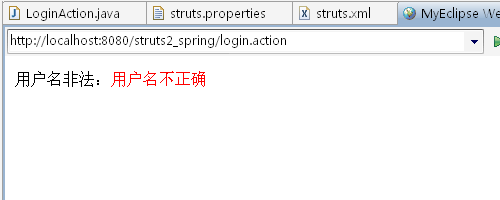标签:style blog http io color ar os java for
我们知道struts1与spring整合是靠org.springframework.web.struts.DelegatingActionProxy来实现的,以下通过具体一个用户登录实现来说明struts2整合spring的相关内容.
一、准备工作
1.实例分析我们在这不与数据库打交道,所有就是当用登录的时候判断用户名是否为指定值,密码是否为指定值,以及相关的异常处理、
2.为什么我们要说struts2整合spring呢?相信在家都知道,我也不用多说了....
3.在 http://struts.apache.org/download.cgi#struts212下载struts2的jar包,源码,API文档.
4.在 http://static.springframework.org/downloads/nightly/release-download.php下载不同版本的spring的jar包,源码,API文档.
5.配置开发环境:MyEclipse6.0+Eclipse3.3+JDK6.0+Tomcat6.0+Struts 2.0.11+spring2.0。
6.新建web项目,导入相应的jar包,如以下所示:
a.由于现在IDE开发工具还没有对struts2.0有很好的支持,所有我们需要手功配置,首先将我们刚下下来的struts2.0的lib里面的commons-logging-1.0.4.jar、ognl-2.6.11.jar、xwork-2.0.4.jar、freemarker-2.3.8.jar、struts2-core-2.0.11.1.jar以及struts2.0里面所需要的插件包struts2-spring-plugin-2.0.11.1.jar添加的WEB-INF/lib下面
b.通过通过IDE开发工具项目对spring2.0的支持
7.在src下建立struts.xml文件(具体的写法在后面呈现)
8.配置web.xml,如下:
<web-app version="2.5" xmlns="http://java.sun.com/xml/ns/javaee"
xmlns:xsi="http://www.w3.org/2001/XMLSchema-instance"
xsi:schemaLocation="http://java.sun.com/xml/ns/javaee
http://java.sun.com/xml/ns/javaee/web-app_2_5.xsd">
<!-- 加载struts2核心 -->
<filter>
<filter-name>struts2</filter-name>
<filter-class>
org.apache.struts2.dispatcher.FilterDispatcher
</filter-class>
</filter>
<filter-mapping>
<filter-name>struts2</filter-name>
<url-pattern>/*</url-pattern>
</filter-mapping>
<!-- 指明spring配置文件在何处 -->
<context-param>
<param-name>contextConfigLocation</param-name>
<param-value>classpath*:applicationContext.xml</param-value>
</context-param>
<!-- 加载spring配置文件applicationContext.xml -->
<listener>
<listener-class>
org.springframework.web.context.ContextLoaderListener
</listener-class>
</listener>
</web-app>
二、建立前台页面
1.用户登录肯定有一个用户登录页面login.jsp,如下:
<%@ taglib prefix="s" uri="/struts-tags"%>
<!DOCTYPE HTML PUBLIC "-//W3C//DTD HTML 4.01 Transitional//CN">
<html>
<head>
<title>login2</title>
</head>
<body>
<s:form name="login" action="login" method="post" >
<s:textfield name="username" label="帐号"></s:textfield>
<s:password name="password" label="密码"></s:password>
<s:submit></s:submit>
</s:form>
</body>
</html>
2.若登录成功的index.jsp文件,如下:
<!DOCTYPE HTML PUBLIC "-//W3C//DTD HTML 4.01 Transitional//CN">
<html>
<head>
<title>login2</title>
</head>
<body>
<div>
<h4>欢迎你!</h4><font color="red">${username}</font>
<br/>
<h4>你登录的密码是<h4><font color="red">${password}</font>;
</div>
</body>
</html>
3、用户名非法提示页面.usernameInvalid.jsp(通过el表达示得到异常信息)
<%@ page language="java" contentType="text/html; charset=GB18030"
pageEncoding="GB18030"%>
<!DOCTYPE html PUBLIC "-//W3C//DTD HTML 4.01 Transitional//EN" "http://www.w3.org/TR/html4/loose.dtd">
<html>
<head>
<meta http-equiv="Content-Type" content="text/html; charset=GB18030">
<title>Insert title here</title>
</head>
<body>
用户名非法:<font color="red">${exception.message}</font>
</body>
</html>
4、密码非法提示页面.passwordInvalid.jsp(struts2标签得到异常信息);
<%@ page language="java" contentType="text/html; charset=GB18030"
pageEncoding="GB18030"%>
<%@ taglib prefix="s" uri="/struts-tags"%>
<!DOCTYPE html PUBLIC "-//W3C//DTD HTML 4.01 Transitional//EN" "http://www.w3.org/TR/html4/loose.dtd">
<html>
<head>
<meta http-equiv="Content-Type" content="text/html; charset=GB18030">
<title>Insert title here</title>
</head>
<body>
密码非法:<FONT color="red"><s:property value="exception.message"/></FONT>
</body>
</html>
三、建立对应的action
1.提供用户请求服务的LoginService类
package org.topCSA.s2s.service;
import org.topCSA.s2s.exception.PasswordException;
import org.topCSA.s2s.exception.UsernameException;
public class LoginService
{
/*
* 我们这只是一个小的例子,不与数据库打交到
* 若有数据库操作,那么在这个LoginService就是操作具体Dao类实现登录的相关操作
*/
public boolean validate(String username,String password)throws Exception
{
boolean v = false;
if(!"xcp".equals(username))//如果用户名不等于xcp,就抛出一个异常
{
throw new UsernameException("用户名不正确");
}
else if(!"123".equals(password))))//如果密码不等于123,就抛出一个异常
{
throw new PasswordException("密码不正确");
}
else
{
v = true;
}
return v;
}
}
2.接收用户请求的LoginAction类
package org.topCSA.s2s.action;
import org.topCSA.s2s.service.LoginService;
import com.opensymphony.xwork2.ActionSupport;
public class LoginAction extends ActionSupport
{
/**
*
*/
private static final long serialVersionUID = 1L;
private String username;
private String password;
/*
* 我们通过Spring的IOC容器注入LoginService,从而减少类之间的依赖关系
*/
private LoginService loginService;
public LoginService getLoginService()
{
return loginService;
}
public void setLoginService(LoginService loginService)
{
this.loginService = loginService;
}
public String getUsername()
{
return username;
}
public void setUsername(String username)
{
this.username = username;
}
public String getPassword()
{
return password;
}
public void setPassword(String password)
{
this.password = password;
}
@Override
public void validate()
{
/*
* 我们可以在这个方法类加一些输入验证 但是为了体现后面我们写的业务逻辑方法这就不验证
*/
}
@Override
public String execute() throws Exception
{
boolean result = loginService.validate(username, password);
if(result == true)
{
return SUCCESS;
}
else
{
return INPUT;
}
}
}
四、配置struts.xml与applicationContext.xml
1.配置struts.properties,为了解决中文问题,具体用法参照struts2的用法如下:里面加上struts.i18n.encoding = gb2312,当然也可以直接加到struts.xml里面写法为<constant name="struts.i18n.encoding" value="gbk"></constant>
2.配置struts.xml
<!DOCTYPE struts PUBLIC
"-//Apache Software Foundation//DTD Struts Configuration 2.0//EN"
"http://struts.apache.org/dtds/struts-2.0.dtd">
<struts>
<package name="struts2" extends="struts-default">
<action name="login" class="LoginAction">
<exception-mapping result="usernameInvalid" exception="org.topCSA.s2s.exception.UsernameException" />
<exception-mapping result="passwordInvalid" exception="org.topCSA.s2s.exception.PasswordException" />
<result name="success">/index.jsp</result>
<result name="input">/login.jsp</result>
<result name="usernameInvalid">/usernameInvalid.jsp</result>
<result name="passwordInvalid">/passwordInvalid.jsp</result>
</action>
</package>
</struts>
3.配置applicationContext.xml
<beans
xmlns="http://www.springframework.org/schema/beans"
xmlns:xsi="http://www.w3.org/2001/XMLSchema-instance"
xsi:schemaLocation="http://www.springframework.org/schema/beans http://www.springframework.org/schema/beans/spring-beans-2.0.xsd">
<bean name="loginService" class="org.topCSA.s2s.service.LoginService" />
<bean name="LoginAction" class="org.topCSA.s2s.action.LoginAction">
<property name="loginService">
<ref bean="loginService"/>
</property>
</bean>
</beans>
五、测试(全部成功)



struts2整合spring应用实例
标签:style blog http io color ar os java for
原文地址:http://www.cnblogs.com/henuyuxiang/p/4079065.html


